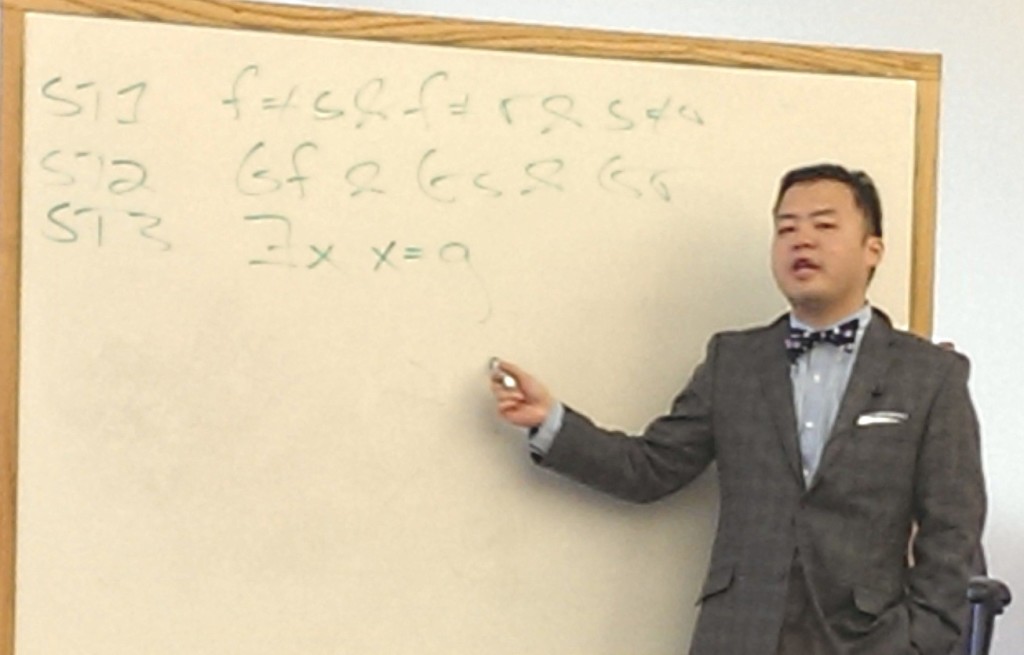Podcast: Play in new window | Download
Subscribe: Spotify | Email | RSS

In this episode we hear Mr. James Lee (PhD student in Philosophy at Syracuse University) present his paper “His Ways (of Being) Are Not Our Ways” at the Society of Christian Philosophers meeting on November 8, 2014 at Niagara University.
Mr. Lee notes that if we translate standard, creedal trinitarian claims into the sort of logic taught in introductory college classes, we get what he calls “The Initial Formulation” (from his handout):
But this group of claims is demonstrably incoherent. To see this, let’s translate back into semi-normal English:
- TL1 – The Father isn’t the Son, and the Father isn’t the Spirit, and the Son isn’t the Spirit. (Those three are numerically distinct from one another.)
- TL2 – The Father is God (is divine), the Son is God (is divine) and the Spirit is God (is divine). Each of those three “is God” – that is, is divine.
- TL3 – There exists some x which is God (divine) and for any y, y is God (divine) only if x just is y. That is, there is some unique God.
Now, it is provable that if any two of these is true, the remaining one is false. Here are informal paraphrases of how each argument would go:
- If TL1 and TLS2 then not-TL3.
- If Father, Son, and Spirit are three, and each is God (is divine) then it is false that there’s exactly one being which is God (is divine). (There would be three!)
- If TL1 and TL3 then not-TL2.
- If Father, Son, and Spirit are three, and there is a unique being who is God (divine), then it is false that each of Father, Son, and Spirit is God (divine). (Only one of them can be that unique being.)
- If TL2 and TL3, then not-TL1.
- If each of Father, Son, and Spirit is God (divine), and there’s only one being who is God (divine), then it is false that Father, Son, and Spirit are numerically distinct. (They would have to be one and the same being, the one who is God.)
There’s nothing controversial about this reasoning; each argument seems valid, and so it can’t be denied that the three claims TL1, TL2, and TL3 are an inconsistent set, a set such that not all of them can be true.
Why is this a problem? Because we all know that inconsistent sets of claims can’t all be true – so at least one third of the Initial Formulation is false. If “the” doctrine of the Trinity requires these three claims, then, it is false – “the” doctrine would then be a conjunction of claims, one of which is false, which makes the whole theory false. (e.g. If you assert A and B and C, and A and B are true, but C is false, then the whole claim “A and B and C” is false.)
Here’s where the Christian philosopher/analytic theologian says to him- or herself:
There must by something wrong with the formulations. Let’s see if we can reinterpret the traditional language so that it comes out seemingly self-consistent.
Self-consistency, of course, isn’t everything. We’d also want a Trinity theory to be well grounded in the Bible and/or post-biblical catholic tradition. But self-consistency is a necessary condition for a doctrine being reasonably believed.
In this talk, Mr. Lee explains some standard ways of making the claims come out self-consistent, each of which he thinks is problematic. He then explores a new way, based on the idea that there are fundamentally different kinds of being or existence (ontological pluralism).
You’ll want to have Mr. Lee’s handout in front of you as you listen to this talk.
You can also listen to this episode on stitcher or itunes (please subscribe and rate us in either or both). It is also available on youtube (scroll down – you can subscribe here). If you would like to upload audio feedback for possible inclusion in a future episode of this podcast, put the audio file here.
Links for this episode:

- “Ontological Pluralism” at Wikipedia
- “Ways of Being” by Dr. Joshua Spencer – an introduction to ways of being in contemporary metaphysics, recommended by Mr. Lee.
- episode 2 – the “Athanasian” creed
- episode 68 – Dr. Harriet Baber on Relative Identity and the Trinity
- previous trinities posts on
- Dr. W.L. Craig’s Cerberus analogy
- social trinitarianism
- Brian Leftow’s “Latin” Trinity theory
- relative identity
- Dr. Kris McDaniel (his publications – see particularly his “Ways of Being”)


Aaron,
I agree.
The more I’ve worked with the biblical Hebrew and Greek over the years, the more I realize how conceptually simple those langauges really were, and how much I need to distantiate myself and avoid forcing the ancient vocabulary to conform to some of the more complex theophilosophical jargon that characterizes the language of the later creeds and confessions of Christendom that were formulated in a different historical and semantic context.
From a conceptual standpoint, I don’t find any indication that the apostles were using biblical Greek to debate things like the difference between nature and identity, or whether or not a being could be composed of multiple persons, or if a person could have dual natures. I think all of that nonsense arose out of the confusion which permeated the religious culture of the Roman Empire several generatations after the apostolic era.
The top of my last post was for Jonathan Jensen. I seem to have left that out.
“The Bible never says that God’s “being” is as high above ours as the heavens are above the earth; rather, it’s His “ways” and “thoughts” that are.”
When I said that certain Unitarian and Trinitarian views did not fit because they “don’t seem to fit with His being as high above us as the heavens are above the Earth.” (quoted from my first post) I meant the word “being” to mean that He is much greater than us…not His manner of being strictly speaking.
“My being the first in line to eat makes me happy.” (this is how I used “being” above)
“In my being I am triune.” (not how I was using it).
Sorry if that may have caused some confusion.
However, I think it is completely appropriate to assume that God’s manner of existence is far beyond our own, since we are talking about the manners of existence of the one uncreated being VS created beings. It seems that we should be very careful to not assume the limitations of created beings (angels, men, or the bene elohim) upon God Himself. Whether God is Unitarian or a Tri-unity (or something else) we will never understand all things about Him. But we can truly know Him for who He is because as you said we have His Spirit…that is the exciting part.
Rivers, thanks for that post. I agree that it is hard for many people today who do not realize the gap of worldview between themselves and ancient Hebrews to read the Bible as they wrote it back then.
Aaron,
Part of the reason that certain “limitations” must be put on our understanding of God (as far as scripture is concerned) is because the biblical Hebrew and Greek languages and ancient and have a much more limited vocabulary.
For example, there is no word in scripture for “eternal” (as we understand it today as timeless or without beginning or ending). Thus, when we speak of God as “eternal”, it is because that is the way we understand His being from our philosophical perspective.
On the other hand, the biblical writers spoke of the Almighty as “the beginning and the end” or “the alpha and the omega” (Revelation 1:8) or “the first and the last” (Revelation 22:13). God was there “in the beginning” (Genesis 1:1). The conceived of God’s existence within the context of all of their “generations” and “ages” (Psalms 90:1-2) because they didn’t have any concept of “eternity” as something distinct from “time” in their language as we do today.
Aaron,
The Bible never says that God’s “being” is as high above ours as the heavens are above the earth; rather, it’s His “ways” and “thoughts” that are. In the context, God also tells them to leave their ways and return to Him. If His ways and thoughts are still that far above yours, then you haven’t come to know Him; as Paul said, “who has known the mind of the LORD so as to instruct Him? But *we have His Spirit*.” He also says that God created us anew in Jesus Christ to do those good works. And one last time, Jesus said to forgive and you will be forgiven.
John,
you rightly speak of ‘nature’ as distinct from ‘identity’. If God had only “made this Jesus whom you crucified both Lord and Christ” (Acts 2:36), if God had only “exalted him and given him the name which is above every name” (Phil 2:9), then divinity would NOT be part of Jesus’ nature, would it? No, it would be ONLY something acquired.
Mario
Quite right!
“Divinity’ refers to ones ‘nature’ and NOT ones ‘identity’
We have so many scriptures which show that Christ has ‘inherited’ his divine nature from His Father.
For HIs obedience even unto death on a cross Christ has been ‘elevated’ and made ‘Lord ‘
Christ is NEVER God by identity – although Trinitarians frequently make this error.
Normally ‘clever ‘men like Bauckham confuse the matter and talk about ‘divine identity’- obviously mixing up nature and identity!!!
Blessings
John
The only question worth asking is, if and in what sense Jesus is divine. The “trinity” is the wrong answer to the right question.
Dale,
This was neat. Certainly one of the things that bothers me most about the Unitarian position (and many Trinitarian ones too) is that it seems to project our human limitations insofar as manner of existence goes, upon God. That doesn’t seem to fit with His being as high above us as the heavens are above the Earth.
Comments are closed.